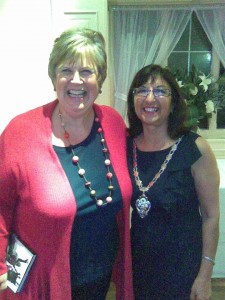“Soldiering On – Letters from War Widows” was the title of a talk given to Cannock Soroptimists recently by club member Dr Janis Lomas.
Janis is an historian, specialising in the history of war widows in the UK.
She gave a talk which was both insightful and emotional, using extracts from the letters of war widows to demonstrate not only the hardship faced by the majority of them from both World Wars but also the way in which they were treated. Pensions were dependant on rank and respectability and could be forfeited if any rules were broken. Amazingly, war widows from WW2 were actually worse off than those from WW1 for most of the war years and all war widows were impoverished after WW2.
 The women found themselves widowed at very young ages, often with small children – and could be left with no pension for many reasons, for example, if they had married a man already disabled from the first world war. These women were left with nothing to live on and of course at that time there was no child care! For many, on top of the grief of losing their husbands, they were faced with making the decision to give up their children to state care because they could not both work and look after them.
The women found themselves widowed at very young ages, often with small children – and could be left with no pension for many reasons, for example, if they had married a man already disabled from the first world war. These women were left with nothing to live on and of course at that time there was no child care! For many, on top of the grief of losing their husbands, they were faced with making the decision to give up their children to state care because they could not both work and look after them.
One woman wrote: Like many other war widows I had no capital and my boy went at eight years to a home, as I had no home and had to take domestic type work to get a roof over my head. So I missed all my son’s childhood only seeing him at holidays . . . the council would not give accommodation as I did not have enough income.
In 1971, Iris Strange, a war widow herself, helped to set up the War Widows Association. After 19 years she saw all of their campaigning come to fruition when war widows were granted vastly increased pensions. Now, thank goodness, women who suffer because their husbands are killed in war or badly injured whilst fighting are treated much more fairly.
Team President Lakhwinder Thompson thanked Janis for her presentation which led to an interesting discussion of members’ memories of how their own families had been affected. Photo: Janis Lomas (on left) with Team President, Lakhwinder Thompson.

